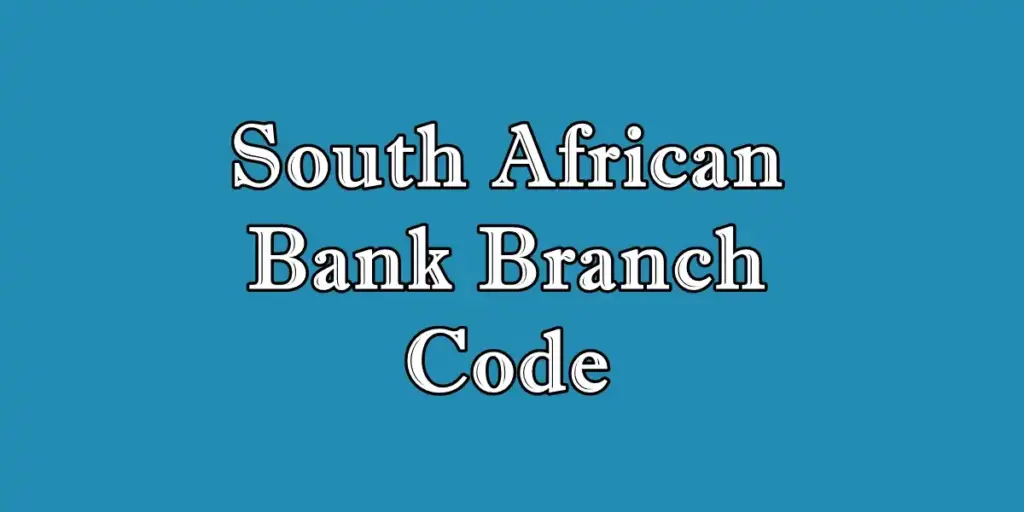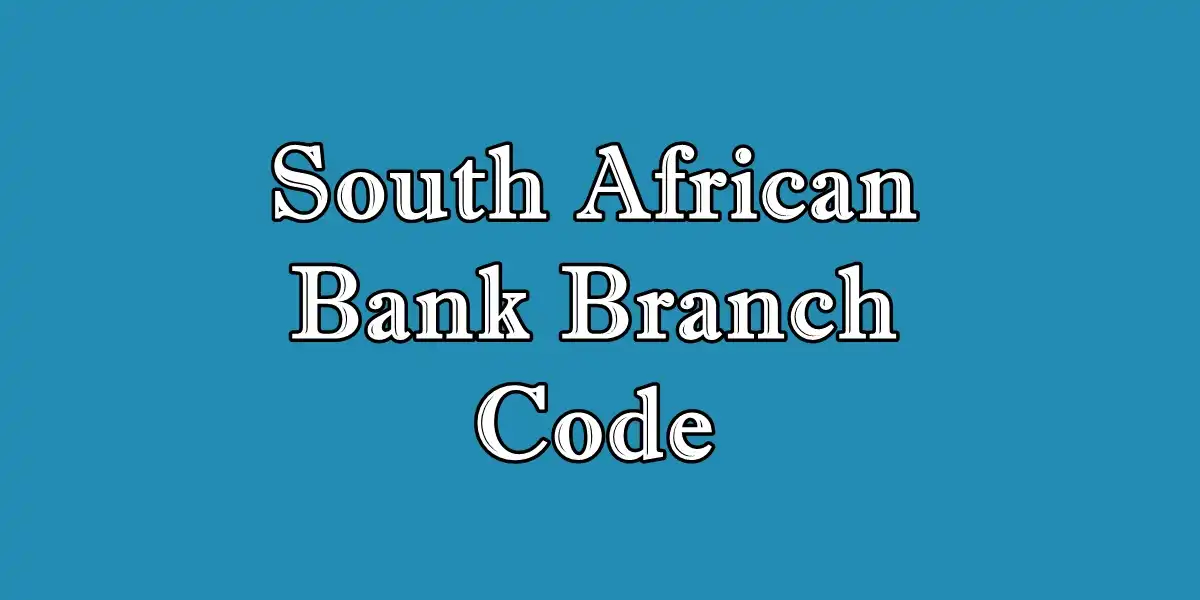
When you need to make an EFT payment, debit order, or receive money in South Africa, the bank branch code becomes essential. Many users often get stuck searching for the correct code, confused between branch specific codes and universal or generic codes. The wrong code can delay your payment or cause it to fail entirely.
This guide solves that problem by giving you a complete, updated, and easy to understand list of South African bank branch codes for ABSA, Capitec, FNB, Standard Bank, Nedbank, TymeBank, and Discovery. You will also learn when to use a universal branch code versus a branch specific code, how banks process EFTs, and how to avoid common payment errors.
Understanding South African Bank Branch Codes
A branch code is a 6 digit number assigned to every bank branch in South Africa. It identifies the branch where a customer opened their account or where the account is held.
What is a universal branch code
A universal branch code is a single code used countrywide for online EFTs. Almost all modern banking platforms accept universal branch codes because they simplify the payment process.
When you should use a universal code
Most EFTs and online payments use a universal branch code because it is faster and compatible with all banks. You should use it when:
- You are paying someone online
- You are receiving money via EFT
- You do not know the specific branch
- You want to avoid failed payments due to incorrect codes
When a specific branch code is required
Rare cases where you might need a branch specific code include:
- Setting up older debit orders
- Business accounts tied to a specific branch
- Legacy banking systems still storing original branch details
South African Bank Universal Branch Codes
Below is the updated list of universal branch codes for major South African banks.
| Bank | Universal Branch Code |
|---|---|
| ABSA | 632005 |
| Capitec | 470010 |
| FNB | 250655 |
| Standard Bank | 051001 |
| Nedbank | 198765 |
| TymeBank | 678910 |
| Discovery Bank | 679000 |
These universal codes work for almost all local EFTs.
ABSA Branch Codes
- 632005
Why ABSA uses a universal code for EFTs
ABSA centralised digital processing in South Africa, meaning all online payments route through their central clearing system. This improves speed and reduces failed transfers.
Examples of ABSA branch codes
| Branch Name | Branch Code |
|---|---|
| Sandton City | 510101 |
| Eastgate | 632005 (universal recommended) |
| Pretoria North | 632005 (default EFT routing) |
Tip
Even if a branch has its own number, ABSA encourages customers to use the universal code for smoother EFT processing.
Capitec Bank Branch Codes
- 470010
Why Capitec uses one code?
Capitec operates digitally without traditional branch code separation. All accounts nationwide share a single routing code. Understanding the national routing codes used by banks in South Africa can make your Transfer Capitec to TymeBank faster and error-free.
FNB Branch Codes
- 250655
Understanding FNB’s dual system
Historically, FNB had physical branch codes, but online banking now routes most EFTs through the universal code. Older business and corporate accounts may still reference specific branch codes.
Common FNB branch codes
| Branch | Code |
|---|---|
| FNB Fourways | 251655 |
| FNB Sandton | 254605 |
| FNB Menlyn | 252045 |
| FNB Online Payments | 250655 (universal) |
Standard Bank Branch Codes
- 051001
Why Standard Bank still lists branch codes?
Standard Bank supports both universal and traditional branch codes because older business accounts and legacy debit orders are tied to fixed branches.
Common Standard Bank branch codes
| Branch | Code |
|---|---|
| Rosebank | 004305 |
| Constantia | 051001 (universal EFT code) |
| Durban North | 042626 |
| Centurion | 012645 |
When to use 051001
Use the universal code for:
- Online banking
- Mobile app transfers
- EFTs from other banks
Nedbank Branch Codes
- 198765
Nedbank’s multi code system explained
Nedbank has many legacy branches with unique codes. However, digital EFTs work best with the universal code.
Common Nedbank branch codes
| Branch | Code |
|---|---|
| Hyde Park | 197705 |
| Sandown | 193305 |
| Menlyn | 163445 |
| Universal EFT | 198765 |
Important note
Nedbank’s system automatically routes deposits using the universal code regardless of the branch the user originally opened their account at.
TymeBank Branch Codes
- 678910
Why TymeBank uses only one code?
TymeBank is a fully digital bank with no physical branches. One branch code handles all accounts, payments, and transfers nationwide.
Example:
If you receive money from any bank, the sender only needs:
- Bank: TymeBank
- Branch code: 678910
- Your account number
Discovery Bank Branch Codes
- 679000
How Discovery Bank processes EFTs?
Since Discovery Bank is digital, it does not use branch specific codes. Every payment is routed through the same universal number.
Business and personal accounts
Whether you hold a personal, platinum, or business banking account, the branch code remains the same.
How to Find a Branch Code in South Africa?
Step 1
Check the bank’s official website under the EFT or Help section.
Step 2
Look at the bottom of your bank statement.
Step 3
Use in app account settings where most banks display your routing code.
Step 4
Use the universal code if unsure. It is accepted in most cases.
Comparison of All Branch Codes
| Bank | Universal Code | Digital Friendly | Notes |
|---|---|---|---|
| ABSA | 632005 | Yes | Best for EFTs |
| Capitec | 470010 | Fully digital | One code for all branches |
| FNB | 250655 | Highly digital | Universal preferred |
| Standard Bank | 051001 | Modern EFT routing | Still supports old codes |
| Nedbank | 198765 | Digital routing | Many older branch codes exist |
| TymeBank | 678910 | Digital only | No physical branches |
| Discovery Bank | 679000 | Digital only | Single code system |
Common Mistakes to Avoid
- Using an outdated branch code from an old card or statement
- Entering a foreign routing code instead of a South African one
- Confusing the bank account number with the branch code
- Using a branch code from another bank entirely
- Not using a universal code when the recipient requests it
Frequently Asked Questions
What branch code should I use for online EFTs in South Africa?
Always use the universal branch code of the bank unless the recipient specifically gives you a branch specific code.
Are universal branch codes safe to use for receiving payments?
Yes. All major South African banks encourage universal codes for digital transfers.
What is the difference between a branch code and a swift code?
A branch code is used locally within South Africa. A swift code is used for international payments.
Can I still use old branch codes for Standard Bank or Nedbank?
Yes, but digital payments work best with universal codes such as 051001 or 198765.
Why do Capitec and TymeBank only use one code?
Because they are digital banks without traditional branch networks.
Does the bank branch code affect how fast my payment reflects?
Yes. Using the universal code improves routing and reduces delays.
What branch code should I use if I do not know the recipient’s branch?
Use the universal code for their bank. It is accepted by all major banks.
Understanding South African bank branch codes helps you avoid failed payments, delays, and unnecessary confusion. Whether you bank with ABSA, FNB, Capitec, Standard Bank, Nedbank, TymeBank, or Discovery, using the universal branch code is usually the safest and most reliable option.
Whenever you are unsure, choose the universal EFT code for the bank, double check the account number, and proceed with confidence. If the payment is urgent, ask the recipient to confirm both their account number and preferred branch code. This simple step will ensure smooth and successful transactions every time.
If you’d like, I can also prepare this article in a downloadable PDF or add your custom branding.

